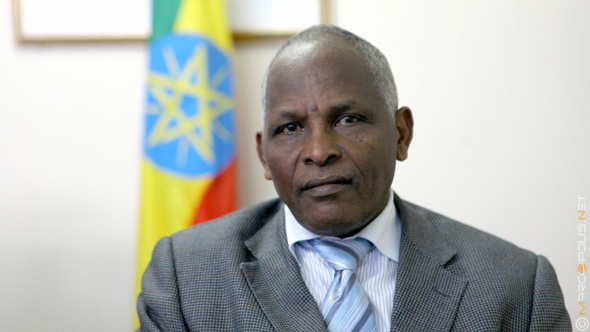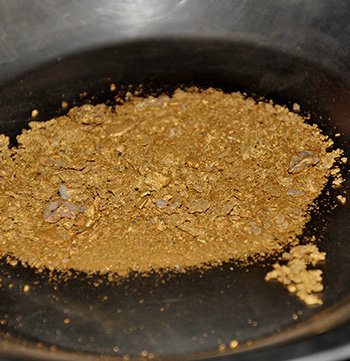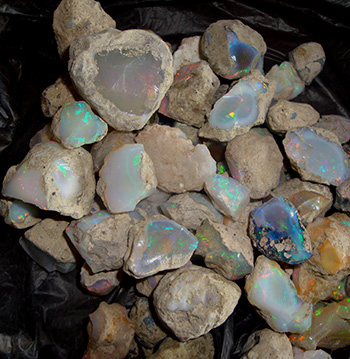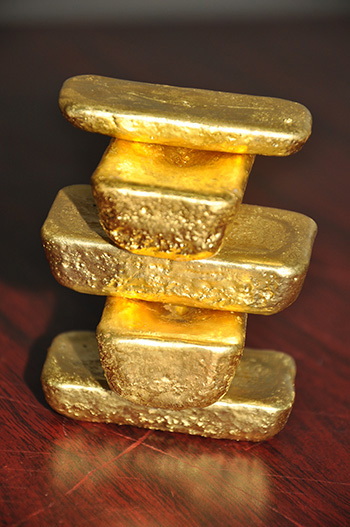Minister of Mines: “The new potential resources available in Ethiopia include potash, platinum, chromium and nickel”
H.E. Tolesa Shagi, Minister of Mines
The Minister of Mines of Ethiopia discusses the new potential resources available in Ethiopia. 2014 should introduce potash and there are also intensive exploration undergoing for oil and gas. Apart from gold, “We have copper, zinc and lead, which we call base metals commonly associated with gold deposits. Recently we have identified great potential in these resources here in Ethiopia. There will also be platinum, chromium and nickel; we haven’t yet identified the deposits but the indication and potential is there,” states the Minister.
Interview with H.E. Tolesa Shagi, Minister of Mines

Thank you for giving us the opportunity today to interview you and talk a bit about the economy and the mining sector in Ethiopia. I would like to start by asking if you could give us your overview of the economic climate of Ethiopia and your outlook for 2014 and onward.
Well, concerning the whole economic trend of Ethiopia, we are quite excited because for the last ten or eleven years we have been doing really well ever since the end of the previous regime. Since then, there has been a change in economic policy which has brought a change in economic development and improved social stability in our nation. A lot has been done to establish social stability here. We have a good strategy and policy for development. In every sector we have seen performance improve increasingly over time. We have had 2 digit growth for the last 11 years. Our strategy now is to maintain this growth and stability. In the mining sector we are also trying to maintain this growth.

The mining industry in Ethiopia has seen substantial growth in recent years, do you see this to be a trend continuing forward?
Yes, definitely. Our challenge is to push forward with this growth. We are working on all aspects of this: in leadership and performance. Leadership is decisive: the competition is global for economic development and there is the dynamism of changing technology and changing management. We have to try to catch up. We are planning ahead how to qualify ourselves and push ourselves forward to keep up. As a nation and in every sector we are working towards that goal and we hope that we will continue to grow successfully. We need to think ahead and we are doing so.
Can you tell us a bit about the important role that your Ministry plays in the development of Ethiopia?
Our sector as you know is the mining sector. All over the world the mining sector is one of the most important sectors in terms of supporting a nation´s economy. We have so much potential in Ethiopia. The resources in Ethiopia are untouched and unexplored because previously we didn’t have the right skills or technology to explore and identify our resources. Now with the regime change and the change in policy we have amended our Mining Act and we are inviting investors from all corners of the world who have the qualifications, reputation and technology to invest in Ethiopia and to work on the development of our natural resources, including our mines. At the moment we have enough investors; some of the best known investors in the mining sector are coming to join us. We hope that these resources will be developed within a few years and will help to contribute to the national economy. As you know, although there are fluctuations in commodity prices, generally the prices are increasing more and more. If we qualify ourselves and regulate the sector in a proper, transparent manner we will reap great benefits from this sector, as will the investors. Obviously we have to respect the environment and the community and follow international standards.
In 2014 we are looking towards the new potential resource that is emerging in Ethiopia: potash.
What are some of the new and upcoming projects or initiatives for 2014?
In 2014 we are looking towards the new potential resource that is emerging in Ethiopia: potash. This is a fertilizer and a very important mineral in the world at the moment. Very few countries have this resource. We are very lucky that we have enough of this resource in Ethiopia. As the agriculture sector grows internationally there is going to be increased demand for this and therefore it will contribute a lot to our economy. Within a few years as we begin to mine potash, Africa and the world will benefit from this resource and obviously Ethiopia will benefit a great deal from it.
Additionally, intensive exploration is undergoing for oil and gas. We haven’t yet found much but we do have potential locations for oil and gas in Ethiopia. We should know what we have in terms of resources later in 2014.
Furthermore, in solid mineral there has been the discovery of gold and the base metals copper, zinc and lead. Some feasibility studies have been carried out and the next step is getting the mining licenses. Some companies will start development from mid to end of 2014. In 2015 and 2016 there will be mining emerging beyond MIDROC Gold Mine that is currently in southern Ethiopia.
Gradually there will be an increase in economic growth from the contribution of the mining sector in Ethiopia over the coming years. That is what we are hoping for and are intensively working towards with investors in Ethiopia. We are aware of the need to become better qualified for the coming years when the mining sector will begin to contribute a lot to the national economy.
 Apart from gold and potash, what other resources might become available in the future? Are there any ongoing studies?
Apart from gold and potash, what other resources might become available in the future? Are there any ongoing studies?
Yes we have tantalum in the south of Ethiopia. We have copper, zinc and lead, which we call base metals commonly associated with gold deposits. Recently we have identified great potential in these resources here in Ethiopia. There will also be platinum, chromium and nickel; we haven’t yet identified the deposits but the indication and potential is there. There are companies that are undertaking exploration activities at the moment.
There will be other industrial minerals like coal for which exploration is already occurring with minor mining activity already started. I have also already mentioned that extensive oil and gas exploration is occurring in Ethiopia. There is huge potential for mineral resources to be identified and deposits to be discovered here.
What type of incentives is your government offering to multinationals such as Allana Potash and Nyota in order to attract them to do business here in Ethiopia?
The incentives are the same for everyone, not just Allana and Nyota. We have about 260 licenses in Ethiopia for companies from all over the country and all over the world. We have the best companies working here in Ethiopia with us. We have a good Mining Act which offers good incentives to attract investors to Ethiopia. The companies may use duty free machines to support their exploration and mining activities and there are many tax and royalty incentives. Also many daily services from our licensing and administration department are set up to support our investors to encourage them to stay in Ethiopia working with us. The Mining Act rules and regulations are very important so that the investors can trust us and want to remain working here in Ethiopia. It is important that they have full confidence in this country. Our government has a firm commitment to supporting these investors.
What are some of the challenges that the mining industry faces at the moment here?
 The first time that we started with a private investment company here, they didn’t have enough money, technology, or skill but they had to try their best. They came here but they didn’t achieve much in those days.
The first time that we started with a private investment company here, they didn’t have enough money, technology, or skill but they had to try their best. They came here but they didn’t achieve much in those days.
Now we are preparing ourselves to establish a criteria whereby we can choose the companies with the best experience and technology to support us in the mining sector. We are supporting the locals as well. It has been a challenge but now we are amending the ways that we do things. We have changed our Mining Act to catch up with the international standards.
A very critical challenge is getting the right professionals. We need the right knowledge both in terms of technology, leadership and regulation to support both the country and the investors. We have to understand what type of mining is occurring and what type of benefits we are creating. We need to know if the investors themselves are supported and happy with our way of doing things here in Ethiopia. We need the right kind of knowledge to be able to support our investors. We lack this at the moment. As investment is increasing more and more, our qualified technicians are going away to join the developers rather than staying in the government offices. However, we do have strategies and we have universities training scientists. We get support from Canada, Australia and other parts of the world for short training workshops.
Finally, can you give us your vision for the mining sector in Ethiopia?
My personal vision and aim now that I am leading the sector, is that we develop our resources with the best companies, whether they be governmental or companies from anywhere in the world. We want companies with the best reputations to join us and work with us. Our commitment, policies, Mining Act, rules and regulations will support them. Our country is stable and peaceful and my government is committed to being transparent and to benefiting these investors as well as our country. When I talk about companies with good reputations I mean companies that know about international standards for the environment, the community, mining issues etc. If we work together and support each other for mutual benefit then the investors will benefit and my nation will benefit.
FAIR USE POLICY
This material (including media content) may not be published, broadcasted, rewritten, or redistributed. However, linking directly to the page (including the source, i.e. Marcopolis.net) is permitted and encouraged.